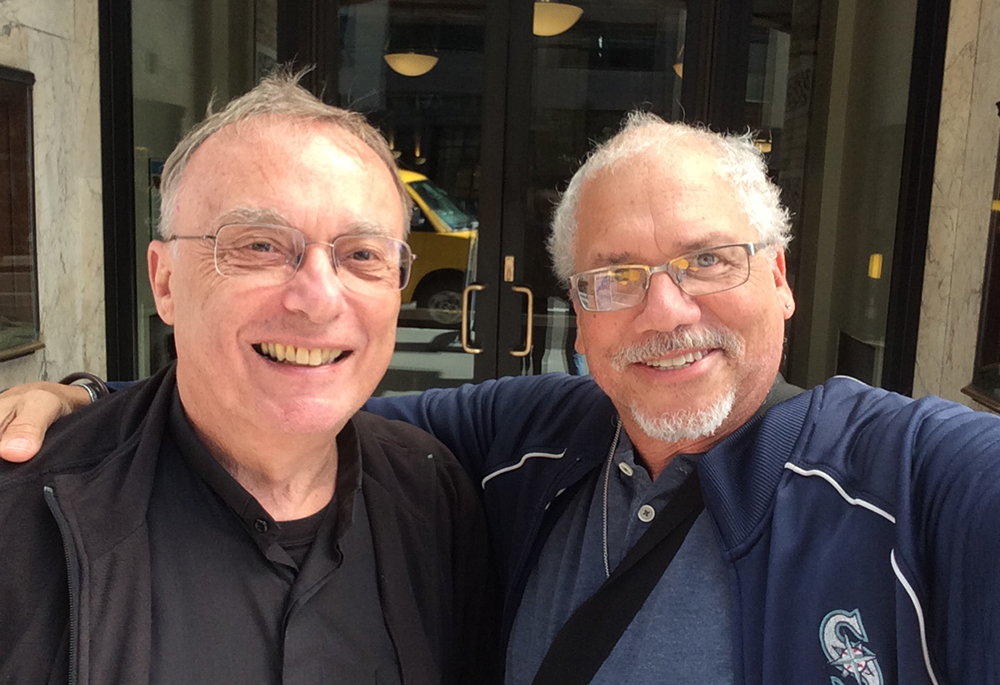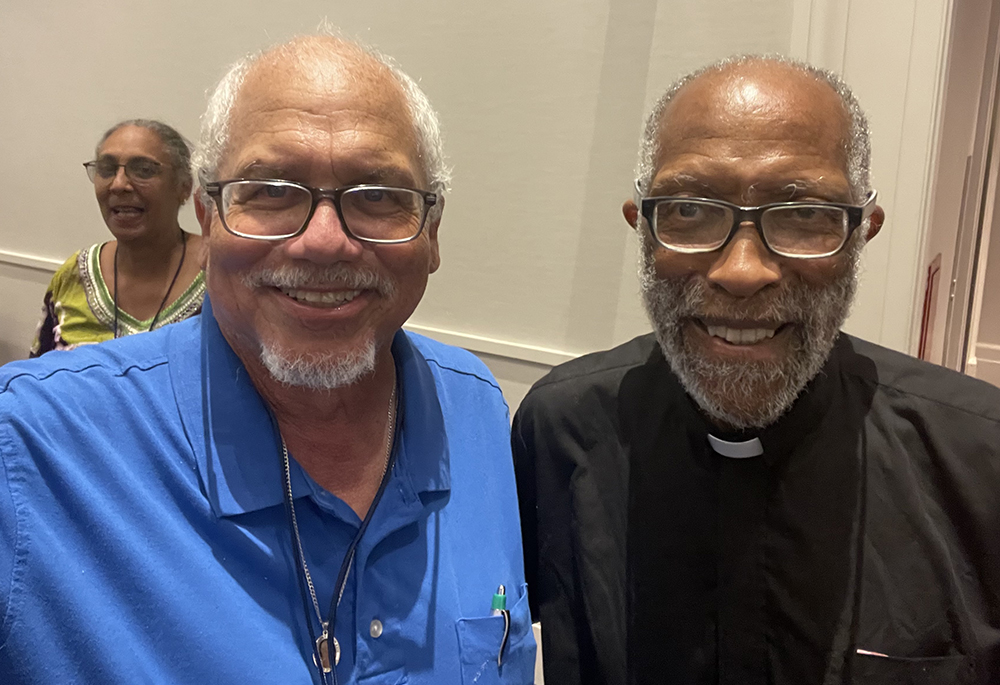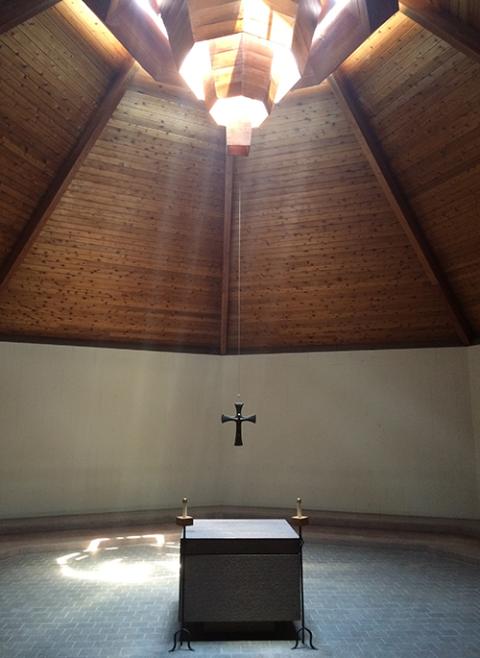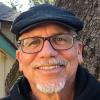
Daryl Grigsby, at right, is pictured with Fr. Paul Magnano, the priest who confirmed him in 1998. (Courtesy of Daryl Grigsby)
On Nov. 1, 1998, I was confirmed into the Catholic Church at St. Therese Parish in Seattle, Washington. Fr. Paul Magnano allowed me to select the day I would be confirmed. Since the communion of saints was one of the Catholic teachings that drew me to the faith, I chose All Saints' Day as my day of confirmation. I remember that day well, particularly the sacrament of anointing; where Magnano applied a generous portion of oil to my forehead in recognition of the Spirit poured lavishly upon us as a seal and source of new life.
I cannot count the individuals who are integral to my journey. The Archdiocese of Seattle had been blessed with the leadership of Archbishop Raymond Hunthausen. By the time I moved to Seattle, he had retired after heavy-handed undermining by the Vatican's Congregation for the Doctrine of the Faith, then led by Cardinal Joseph Ratzinger. Yet, Hunthausen's influence continued among the Catholics of Seattle. He opposed nuclear buildup, supported LGBTQA+ Catholics, encouraged lay leadership, and was active in social justice movements.
One of his legacies was appointing women as pastoral life directors at parishes lacking full-time priests. St. Therese was then led by Patty Repikoff, and her energy and spirit permeated the parish. The church was racially diverse, and featured a gospel choir and many local, national and global ministries of justice.
The communion of saints is for me a constant reality, for my journey has been preceded by and accompanied with many lay persons, religious sisters, deacons, priests, bishops, writers, activists, and others who are a daily inspiration. In Seattle, I was part of a Black Catholic men's monthly breakfast that was a window into the quiet influence of Black Catholics in the secular world. Years later, in San Luis Obispo, California, I was part of a "Catholic circle" that met weekly for reflection, discussion and laughter.
I am able to journey alongside Catholics across time and space. Jesuit Fr. Ignacio Ellacuría's essay "On Liberation," Franciscan Sr. Thea Bowman's 1989 address to the U.S. bishops' conference, St. John of the Cross' "The Spiritual Canticle," Pope Paul VI's 1967 encyclical Populorum Progressio, and many others are resources to which I often return for nourishment. I have been blessed by the vast richness of Catholic theologians and scholars, including Fr. Raymond Brown, Professor M. Shawn Copeland, Dominican Fr. Edward Schillebeeckx, St. Joseph Sr. Elizabeth Johnson, Jesuit Fr. Karl Rahner, Franciscan Sr. Ilia Delio, and many others.
The master's program at Seattle University School of Theology and Ministry taught me the importance of academic rigor, spiritual formation, and practical experience. I have attended life-changing events like the Los Angeles Religious Education Congress and the 13th National Black Catholic Congress. The LA Congress features workshops, speakers, liturgies and morning praise that transforms the gathering into a retreat. At the National Black Catholic Congress, I was exposed to the breadth of the Black Catholic experience in the United States; and through prayer song, story, sacrament and witness — the gift of Black Catholics was reaffirmed.

Daryl Grigsby, at left, with Msgr. Ray East at the 13th National Black Catholic Congress in 2023, in National Harbor, Maryland. (Courtesy of Daryl Grigsby)
At the former School of Applied Theology in Oakland, I enjoyed Immaculate Heart of Mary Sr. Sandra Schneiders' examination of Mary Magdalene's encounter with the risen Christ in Chapter 20 of the Gospel of John, and Fr. Michael Fish, a Camaldolese monk, pointing us toward a deeper awareness of God's presence. In the Loyola Institute for Spirituality's nine-month Spiritual Exercises in Daily Life, I learned of Ignatian imagination, spiritual freedom, and the gift of praying for and noticing particular graces in life.
During the pandemic shutdown I participated in an online sabbatical renewal program at the Jesuit School of Theology in Berkeley, now part of Santa Clara University. It was an incredible experience, with weekly workshops, spiritual direction and auditing classes offered at either the JST or the Graduate Theological Union. My classmates were priests, religious and laypeople from Mexico, Uganda, Scotland, Tanzania and the Philippines, and were embodied reminders of the "pilgrim church throughout the world." Their collective wisdom continues to enlighten my path.
I have had the privilege of meeting and working with people of faith through Get On the Bus, a program connecting children with their incarcerated parents. I have witnessed the devotion and service of fellow board members, staff and volunteers for Leadership Foundations, a faith-based group that partners, empowers and collaborates with the community, churches, nonprofits, governments and businesses to confront critical challenges in their respective cities. From homelessness in Fresno, gang intervention in the San Fernando Valley, and youth mentoring in Memphis to human trafficking in New Delhi, Leadership Foundations pursues Zechariah's vision that cities be transformed from battlegrounds to playgrounds (Zechariah 8:5).

The chapel at the New Camaldoli Hermitage in the Santa Lucia Mountains of Big Sur, California (Courtesy of Daryl Grigsby)
I have become increasingly aware of the gift of being Black and Catholic. While in the master's program at Seattle University School of Theology and Ministry, one of my field projects was to interview Black Catholic elders at my parish. I heard stories of how their families in New Orleans, Baltimore and Seattle experienced overt racism from priests and other parishioners. They recounted instances where the priest used the "N-word" or refused to bury family members, and the times they were seated in the back or the balcony to receive the Eucharist after all the white parishioners. Despite those obstacles, they remained Catholic, attended Mass regularly, and told me with conviction, "No one was going to make me leave the Catholic Church, for that is where I found God."
Such devotion remains. Data shows the majority of Black Catholics, approximately 75%, attend parishes where Blacks are not in the majority. This is in stark contrast to white Catholics, Hispanic Catholics, and Black Protestants, who predominantly attend churches or Masses where their race is in the majority. One could conclude that those 75% of Black Catholics find their devotion to God through the church even more important than worshiping among their own race. This devotion, I contend, is a gift Black Catholics offer both to the church and the wider society. It is uncommon, in our racially divided nation, for any race to worship weekly where they are not the majority. Yet 75% of Black Catholics do that every time they go to church.
I am most inspired by those Catholics who embody the good news of God's reign by their deeds of mercy and justice. Missionary of Jesus Sr. Norma Pimentel of Catholic Charities of the Rio Grande Valley, Marguerite Barankitse of Burundi, the martyred Jesuit Fr. Rutilio Grande of El Salvador, Jesuit Fr. Greg Boyle of Homeboy Industries, the Catholic Mobilizing Network, Dr. Paul Farmer of Partners in Health, and thousands of organizations, parishes and individuals work tirelessly to uphold human dignity, work for mercy, and promote peace with justice. Their work expresses Catholic teaching on integral human development.
Advertisement
I am honored to be alive during the papacy of Pope Francis. His call for mercy, care of our common home, solidarity with migrants, and a synodal, welcoming Catholic Church has been both a gift and a call to do more. His writings, Evangelii Gaudium, Let Us Dream: The Path to a Better Future, Fratelli Tutti, Desiderio Desideravi and "Laudato Si', on Care for Our Common Home," call us to act on behalf of others and the planet. The synod on synodality is a call to deepen our journey as a church and a member of the human family. It is not a program but a lifestyle where our listening to and with others enables us to discern the many things Jesus promised the Spirit would tell us (John 16:12).
For all the Catholic Church's incredible flaws and sordid history, the miracle is that there remains integrity, holiness, justice and mercy in the church.
The priest abuse crisis and the cover-up by some bishops have destroyed lives, bankrupted dioceses, closed parishes and left an unforgettable blot on the church. Further, our limits on women's voices and talents, reactionary views on sexual orientation and gender identity and, in the U.S. at least, complicity with racism and political ideology, make it difficult for many to remain Catholic.
Yet, like many in our pilgrim church, I have found God in the Catholic Church. The liturgical year, Catholic social teachings, the communion of saints, the Eucharist, and the ethic of mercy in action are evidence that the risen Christ "is present in our midst." The church is where I see glimpses of Ephesians 1:10, of God's mysterious plan to gather all things in Christ.
Finally, a word on the Eucharist. When I was considering becoming Catholic, I asked a St. Therese parishioner why they were Catholic. He replied without hesitation, "It's all about the Eucharist." I now see what he meant, as I am continually inspired by this sacred mystery.
"Take this, all of you," resonates through centuries and around the world. The Eucharist holds exhaustive riches. It is Christ's body given for us, Christ's presence among and in us and Christ's solidarity with the suffering. It is also the church's eternal offering of service, the church's participation in the fullness of God, and the church's immersion into our role as the body of Christ and the sacrament of unity with all humanity.
The tattoo on my left arm is of the chalice and the host, a daily reminder of the beauty and truth of the Eucharist. The Eucharist creates, sustains and enlivens the church. Imagine a church so transformed by the Eucharist that it is a light on a lamp stand, "giving light to all in the house." That church exists, often obscured by our own shortcomings. Yet, in ways we do not fully grasp, all over the world, Catholics are "doing greater works" than Jesus (John 14:12), as the pilgrim people of God.








